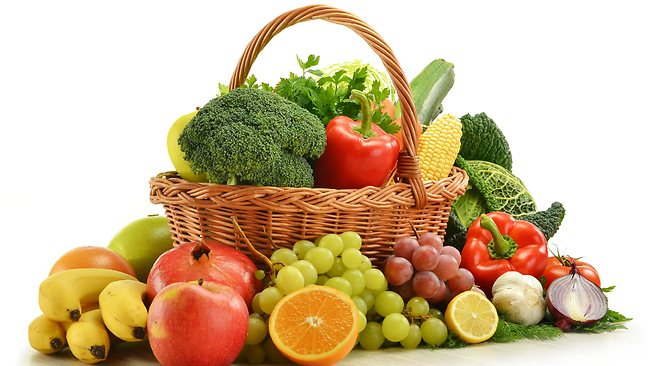Fruits and vegetables are the most valuable players in your healthy diet because they’re loaded with vitamins and minerals and low in calories. Eating a variety of whole, unprocessed fruits and vegetables will not only help you meet your weight loss goals, it will protect your overall health as well. Not convinced? Courtney McCormick, Corporate Dietitian at Nutrisystem gives 10 more reasons to eat these colorful, flavorful foods.
- Low-Fat Protein
Yes, protein. We tend to classify vegetables and fruits as carbohydrates, but they also contain amino acids, the building blocks of protein. A cup of broccoli, for instance, has 2.57 grams of protein and an avocado has 4 grams. Even fruits help supply the 15 to 20 percent of total calories from protein that you need each day. Blackberries and kiwis, for example, each have 2 grams of protein per cup. - Nutrient Density
A helpful way to think about your food choices is nutrient density, a ratio of the vitamin and mineral content to calories. Fruits and vegetables top the list of most nutrient-dense foods because they’re packed with the healthiest compounds, but very low in calories. You get more bang for your buck from eating produce because you get more nutrition in every bite than with almost every other type of food. - Disease Defense
People who eat a diet rich in vegetables and fruits reduce their risk of heart disease, stroke, hypertension (high blood pressure), some types of cancer, and digestive problems, and are less likely to suffer from diabetes and other blood sugar disorders, according to the National Institutes of Health. Eating more fruits and vegetables may be the single most important step you can take to protect yourself from non-communicable diseases. - Easier Digestion
The process of breaking down food you eat into nutrients your body uses can take up to 30 hours. Fruits and vegetables contain more fiber than other types of food and it plays a key role in keeping your digestive tract working swiftly and smoothly. Eating lots of fresh produce prevents constipation and other kinds of digestive discomfort. - Nearly Unlimited
You might think of non-starchy vegetables as the hunger killers. Whenever you are feeling famished, you can snack on your favorite veggies with no guilt. - Endless Variety
From crunchy carrots to spicy peppers, buttery pears to sweet strawberries, you find more diversity of taste, texture and color in the produce department than anywhere else in the supermarket. No matter what you’re craving, there’s a vegetable or fruit that’s certain to satisfy it. - True Versatility
You can never be bored when eating fruits and vegetables because there are so many ways to enjoy them. When raw, they’re at their crunchiest and juiciest. Roasting caramelizes their natural sugars, making them sweeter, while deepening their other flavor components. Steaming brightens up their tastes, bringing their full complexity to the surface. Grilling vegetables and fruits adds smoky flavor that makes every meal seem like an outdoor barbecue. - Naturally Portable
In today’s fast-paced lives, many of us frequently refuel our bodies away from home, on the way from one appointment to the next. Fruits and vegetables are ideal for eating on-the-go because they’re so easy to take along wherever you will be. Many come in convenient single serving portions, some (like apples and bananas) even have their own built-in packaging. - Best Deal
Pound for pound, calorie for calorie, nutrient for nutrient, fruits and vegetables are the best bargain when you’re food shopping. Fresh produce costs less per pound than meat and seafood. And you get more nutrients per dollar spent from fruits and vegetables than you do from grains or any other item in the supermarket. Eating well for less is an unbeatable deal. - Healthier World
The resources, such as water and energy, needed to grow and distribute fruits and vegetables are significantly lower than those used in meat production. Eating more produce reduces the environmental impact of your diet and hel

